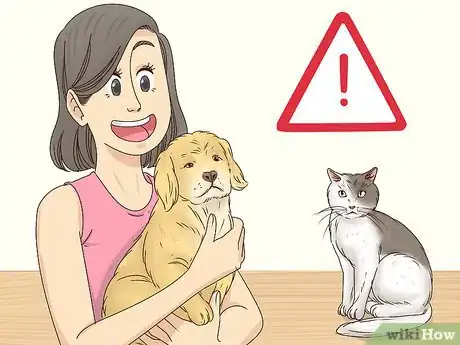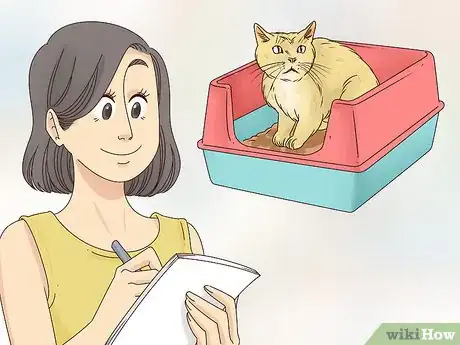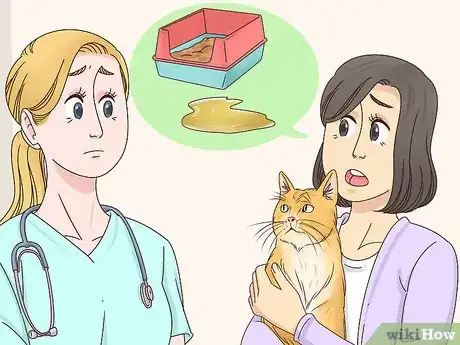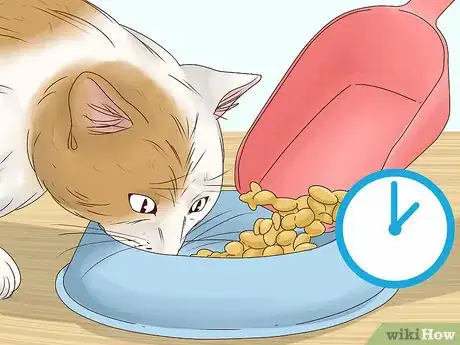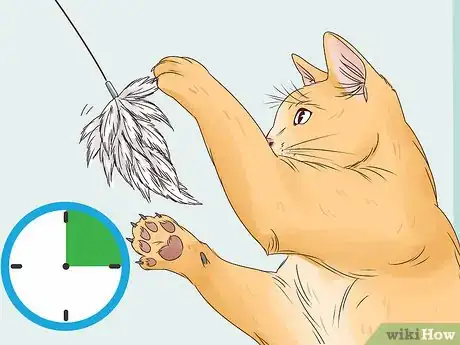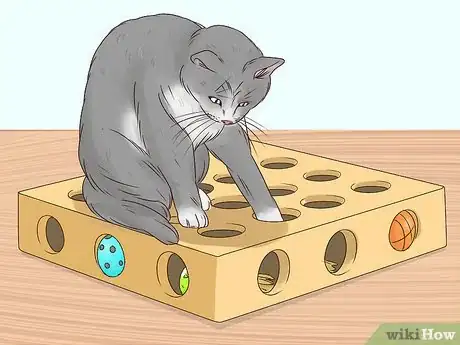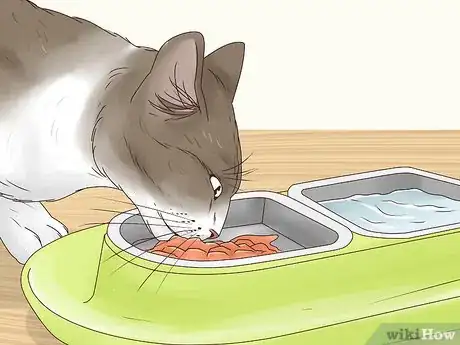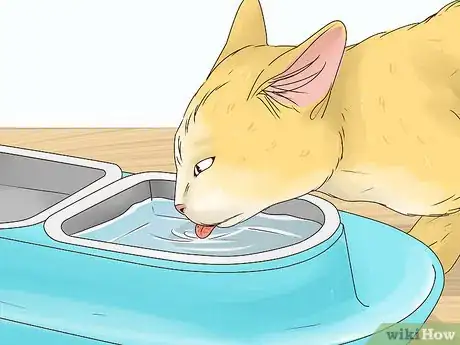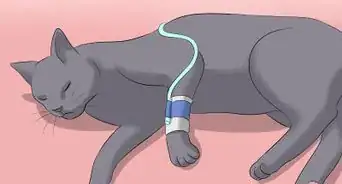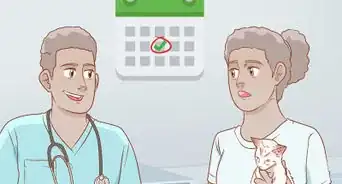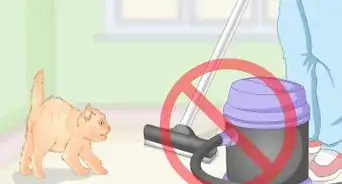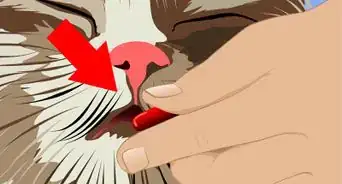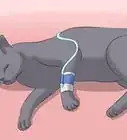This article was co-authored by Melissa Nelson, DVM, PhD. Dr. Nelson is a Veterinarian who specializes in Companion and Large Animal Medicine in Minnesota, where she has over 18 years of experience as a veterinarian in a rural clinic. She received her Doctor of Veterinary Medicine from the University of Minnesota in 1998.
There are 10 references cited in this article, which can be found at the bottom of the page.
This article has been viewed 13,751 times.
Frequent urination is a symptom in cats that could be associated with a number of health conditions, including diabetes and kidney failure. Rule out behavioral causes and visit your vet as soon as possible to figure out what is causing your cat's overactive bladder. Treatments may include medication, dietary improvements, increased hydration, and reduced stress.
Steps
Visiting the Vet to Determine the Cause
-
1Rule out behavioral causes. Before visiting your vet to look into medical causes, look for signs that the problem is behavioral. Your cat urinating outside of the litter box could indicate urine-marking, which is likely to occur in an area of your home that you, other family members, or another pet enjoy spending time.
- To get help dealing with such behavioral issues, search for a certified animal behavior consultant near you by visiting the International Association of Animal Behavior Consultants' website at http://iaabc.org/consultants/cat.[1]
- Urine marking can be due to a change in the household, like getting a new pet or moving furniture around. Try to make changes gradually to help your cat adjust.[2]
-
2Record specific details. While frequent urination is somewhat common in cats, specific details about your cat's symptoms may assist your vet in determining the cause. Write your observations in a journal over the course of several days. Note how often your cat visits the litter box, how much urine it actually expels, and how much water it is drinking.[3]
- For instance, frequent attempts to urinate with little success may be because of an infection or bladder irritation.
- Excessive drinking and urinating may be a result of diabetes, hyperthyroidism, or kidney failure.
Advertisement -
3Visit your veterinarian. If your cat is displaying signs of frequent urination, schedule a visit to your veterinarian as soon as possible. Share all relevant information about your cat's symptoms with the vet (e.g. frequency of urination, amount of urine produced) so that they can test for possible illnesses. In the worst case, surgery might be necessary to address the problem (e.g. a pituitary tumour).[4]
- Be sure to mention to (or remind) your vet of any medications that your cat might be on, that may have side effects contributing to your cat's frequent urination.
- If your cat's frequent urination (or frequent attempts at urination) is accompanied by serious symptoms or obvious distress (e.g. blood in the urine, crying when trying to urinate), contact your veterinarian right away or call an emergency animal clinic.
- To help diagnose the problem, your cat's vet will measure their fluid intake and urine output, and also perform a complete blood count (CBC), x-rays, and urinalysis.[5]
Reducing Your Cat's Stress
-
1Maintain a routine. If your vet has ruled out medical causes for your cat's frequent urination, stress may be the culprit. Your cat's anxiety may be explained by recent changes in its life (e.g. moving to a new home, adjusting to a new pet) or separation anxiety, which might result in elimination issues. To ease your cat's stress, maintain a solid routine by:[6]
- Maintaining set mealtimes
- Moving furniture as infrequently as possible
- Keeping a set time for grooming (e.g. brushing)
-
2Use a calming synthetic pheromone spray. Synthetic pheromone sprays (available online and at veterinary clinics) simulate cheek pheromones released by cats to mark their territory as safe. These sprays have a calming effect on nervous cats and can alleviate anxiety that causes behavioral issues. Ask your vet if a pheromone spray would be right for your pet.[7]
-
3Play with your cat regularly. To help reduce your cat's stress, play with it every day for at least 15-20 minutes. Regular, interactive play helps cats build confidence and reduce anxiety. Opt for chasing and hunting games, which will also ensure that your cat uses built up energy that may contribute to jumpiness or stress.[8]
-
4Purchase puzzle toys to keep your cat occupied. To keep your cat busy and entertained when you are busy, purchase a puzzle toy that can be filled with treats for your cat to work for. These interactive toys can keep your cat busy and motivated for hours, which may in turn reduce separation anxiety, boredom, and stress. A variety of safe, non-toxic puzzle toys are available online or in pet stores.
Administering Treatments
-
1Give your cat medicine. If your cat's frequent urination is due to a urinary tract infection or bladder infection, you will likely have to administer antibiotics to your cat for several weeks. Give your cat medicine by hiding it in food, or by wrapping your cat in a towel or blanket to keep it calm and restrained while you administer the medication orally. Reward your cat for its cooperation with treats or petting.
-
2Implement a new diet. If your cat's frequent urination is due to a condition like diabetes, your vet will recommend dietary changes to improve the situation and prevent further complications. Low protein diets, for example, are used to treat diabetes and chronic renal failure in cats. However, keep in mind that if your cat is diagnosed with diabetes, then he will also need regular insulin injections.
- Be sure to buy good quality food with minimal preservatives.[9]
-
3Increase your cat's water intake. As contradictory as it may seem, increasing your cat's water intake may help to alleviate its frequent urination. If your cat has been diagnosed with a urinary tract infection (UTI) or lower urinary tract disorder (i.e. a condition affecting the bladder or urethra), it will likely urinate more frequently, but in smaller amounts. Not drinking enough water can increase your pet's risk of having such conditions recur, especially older cats who are prone to dehydration.[10]
- Place extra water bowls around the house, or purchase a small drinking fountain at a pet store to entice your cat to drink.
- Replacing dry food with canned food is another way of increasing your cat's water intake.
References
- ↑ https://www.vetinfo.com/frequent-cat-urination.html
- ↑ https://www.aspca.org/pet-care/cat-care/common-cat-behavior-issues/urine-marking-cats
- ↑ http://www.pethealthnetwork.com/cat-health/cat-diseases-conditions-a-z/why-my-cat-peeing-so-much-polyuria
- ↑ http://www.cat-world.com.au/polyuriapolydipsia-in-cats
- ↑ http://www.petmd.com/cat/conditions/urinary/c_ct_polydipsia_polyuria
- ↑ http://www.pet-happy.com/stress-in-cats-causes-symptoms-and-treatments-of-anxiety-and-stress-in-cats/
- ↑ http://www.feliway.com/us/FELIWAY
- ↑ http://www.catbehaviorassociates.com/interactive-play-therapy-for-cats/
- ↑ http://www.cat-world.com.au/polyuriapolydipsia-in-cats
About This Article
If your cat is frequently urinating, it could be a sign of an underlying issue, so it's important that you take it to see a vet so they can help you figure out what's going on. The vet will likely perform blood tests, x-rays, and urinalysis to determine what the problem is. If your cat has an infection, your vet may prescribe antibiotics to clear things up. Diabetes can also be a cause of frequent urination, in which case your vet will likely recommend switching up your cat's diet. If your vet rules out an underlying medical condition, stress might be the cause. You can reduce your cat's stress by playing with it for at least 15 minutes every day and getting it some interactive puzzle toys to keep it entertained when you're not around. For tips from our Veterinary co-author, like how to rule out behavioral causes of frequent urinating in cats, keep reading!
